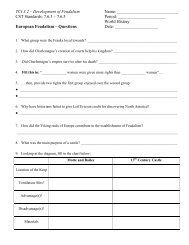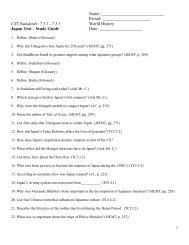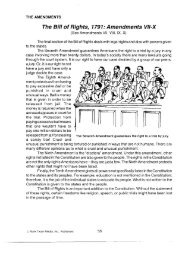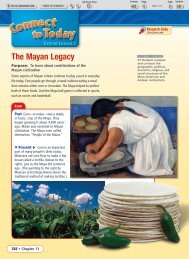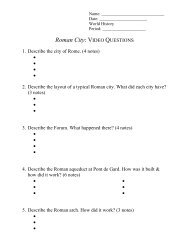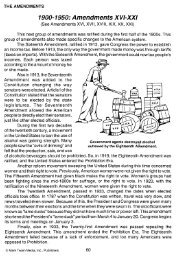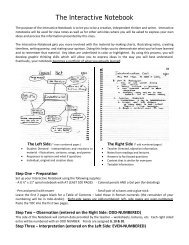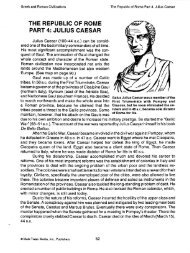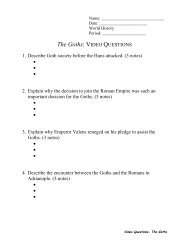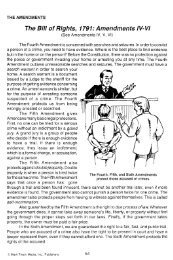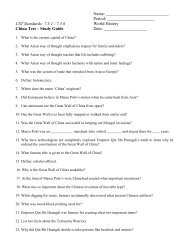i - CA.indd - Teacher
i - CA.indd - Teacher
i - CA.indd - Teacher
- No tags were found...
Create successful ePaper yourself
Turn your PDF publications into a flip-book with our unique Google optimized e-Paper software.
Extend Lesson 3fromSUNDIATATHE EPIC OF THELion KingRetold by Roland BertolBackground: Sundiata founded the empire of Mali. He became known as“the lion king.” The story of his life is a favorite West African oral tradition. Thisselection is from one retelling of his life. Sundiata is seven years old and cannotuse his legs. The evil Sumanguru, King of Sosso, has killed 10 of his brothers.His 11th brother, Kalabamba Diokunto, has come to power, but he is weak.Farakurun and Kekotonki are men of the village who discuss the prophecy thatSundiata would become the king that would lead their city of Niani to freedom.Reading 3.3 Analyzecharacterization asdelineated through acharacter’s thoughts,words, speech patterns,and actions; thenarrator’s description;and the thoughts,words, and actions ofother characters.170 • Chapter 5
Just then a lookout on the crumbling wall called out: “He comes.The Master comes. Sound the drums of honor.”Followed by his men, Sumanguru was coming across thegrasslands for his monthly share of the harvest and many cattle besides.“Did you say, ‘He comes’?” cried Kalabamba Diokunto from withinhis hut. Soon he was rushing along the streets crying, “Bring out yourfairest children so that the Master may choose.”Farakurun clenched his gnarled hands and looked down at the groundbeneath his feet. “You are no King, but an insect,” he muttered darkly. . . .Sumanguru marched into town to the sound of drums. The peopletrembled and Sumanguru smiled.“You are early this month. The harvest is not yet in, Master,”stammered Kalabamba Diokunto as he looked down at Sumanguru’sfeet. He did not dare look higher than that, from fear of the terrible eyes.Why was Kalabamba afraid of Sumanguru?Suddenly, Sumanguru placed his heavy hands upon Kalabamba’sshoulders and smiled. “Dear Kalabamba, why call me ‘Master’? Call mebrother instead. Say it. Say ‘Brother’ to me and I will call you brother also.”“Bro—Brother . . .” stammered the King.“Louder, louder, Brother. Let all Niani hear that we are brothers,that it may rejoice at your good fortune.”“Brother!” said Kalabamba Diokunto. “Brother.” And now the foolishKing began to strut about like a rooster displaying his feathers.“You, Kekotonki.” He pointed at that unhappy man. “I have heard youwhispering behind my back, saying evil things. We shall settle thiswhen my brother is gone.”This photograph of the areaaround Sundiata’s homelandreveals the sparse vegetationof the region. ▼West Africa • 171
“Good, Brother. Make them cringe in terror, for that is the only joythere is,” shouted Sumanguru.“And you also, Farakurun, for you are a useless old man!” NowKalabamba Diokunto wagged his head from side to side and laughed.But Sumanguru wearied of his game. “Kill him,” he said andKalabamba Diokunto fell under the knives.“Where,” Sumanguru now asked, “is the twelfth and last son ofNare-Famakan, that unfortunate ruler?”Kekotonki pointed mutely to Sundiata . . . who still lay in the dustbeside his mother’s feet.Sumanguru strode up to him and looked down. “How old are you,future King of all Niani?” he demanded.“He is seven,” replied Kekotonki.“Let him speak for himself!” snarled the King of Sosso. “I havejust made him a King.”“He has never spoken.”“Then let him stand before me.”“He cannot stand.”So Sumanguru crouched beside the boy. “I have come to pay myrespects, O King of Niani. I grieve the loss of your fine brothers andtheir deaths sadden me.”Sundiata was amember of theWest AfricanMalinke people.This sacred hutis cared for bymodern Malinkeholy men. ▼Does Sumanguru respect Sundiata?Sundiata looked into the terrible eyes ofSumanguru. “I will walk now,” said the boy,and they were the first words he had everspoken. He struggled to rise but his kneeswould not hold him up and he slippedback into the dust.“A stick, get him a stick,” orderedFarakurun. A stunned villager gavehis walking stick to the outstretchedhands of the boy. Again, Sundiatastruggled to rise, leaning on the stick,but the stick broke under his weight.“You,” shouted Farakurun toone of his assistants, “get me a bar ofiron. Quickly.”172 • Chapter 5
The bar of iron was brought. The boy took it in his arms and proppedit in the ground. Again he struggled to rise but the bar twisted andbent in half, and still Sundiata did not rise.“In my shop you will find a rod of iron which three men cannotlift with ease. Go fetch it,” ordered the smith. Soon, struggling menreturned with the heavy bar and rolled it to the foot of the boy.Effortlessly, Sundiata propped it up and struggled to rise. And therod twisted and bent in half, and still Sundiata did not rise.What is the significance of Sundiata bending the iron rod?“What sorcery is this?” muttered Sumanguru to himself. Everybodywas silent. Nobody dared to move. Sweat poured out of Sundiata in aflood, and still he lay in the dust, his useless legs stretched out before him.“I know,” shouted Kekotonki. “Bring him the scepter of the kings.”The thin reed, symbol of Niani’s power, was brought to the child.The scepter weighed no more than a hollow gourd [a vine like apumpkin or squash], yet Sundiata grasped it in his hands and rosefrom his prison of earth.Now, on shaking limbs, Sundiata smiled up at Sumanguru theAccursed and said: “I am glad you grieve the loss of my brothers, whowere dear to me also. Yet more will you sorrow in time to come.”Sumanguru backed away, then laughed. “We will meet again later. . . .There are other regions for me to conquer.”Sumanguru left the city of Niani and returned to his castle, shaken.1. READING: Characterization Based on thecharacterization of Sundiata in this story, what kind ofleader do you think Sundiata will be?2. WRITING: Response to Literature This is anoral tradition that combines fact and fantasy. Write aparagraph about which parts of this story you think arefact and which parts are fiction. Explain why.Writing 2.2Write responses to literature.West Africa • 173




